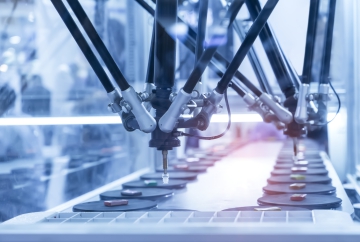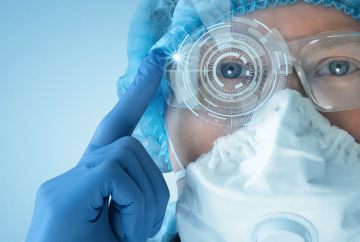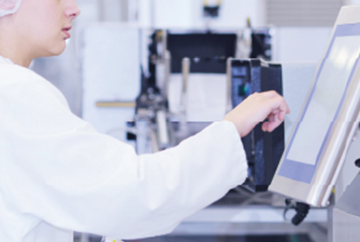Top Reasons for AI Adoption in Medical Device Manufacturing
Click to zoom in
Faster Drug Development
Drug development is perhaps one of those areas in medicine that stands to benefit the most from AI and its allied technologies. The process of developing a drug can be highly resource-intensive, often requiring thousands of person-hours and millions of hours to be sunk into development. A closer examination into the process reveals that the analytical work takes a bulk of the time to go through across the stages of drug development.
An initial step in drug development, identifying pathways, now has so many data sources to draw from, making traditional methods highly ineffective in reaching a definite conclusion in time. For example, some drug companies are looking to leverage AI & ML to search for new indications (uses) for their existing portfolio of products, like finding existing drugs used for other diseases that may be useful in treating COVID-19. This drug repurposing would dramatically reduce the cost and time of bringing a needed therapy to market, improving and saving patients’ lives.
Diagnosing Diseases
In a world that is mired with travel restrictions, reduced hospital visits, and postponement of critical care activities, medical health providers seek alternative methods to engage with their patients in meaningful ways while being conscious of their operating constraints. The tools which enable such interactions will have to be forged by medical device manufacturers, who are increasingly pivoting to a ‘
servitization model,’ wherein device manufacturers realize more excellent value from product leasing, allied services, etc.
In this regard, providing Diagnosis-as-a-Service (DaaS) can be particularly appealing to manufacturers and health providers. It eliminates the need for a significant upfront investment and drastically increases the lifetime value from the manufacturers’ standpoint. AI has proven to be highly efficient in
diagnosing a whole host of diseases from various data sources, with more advanced capabilities being just around the corner. This is a golden opportunity for device manufacturers to begin investing in AI-enabled ‘smart’ devices that can equip doctors with more powerful tools, thereby transforming healthcare for much of the population.
Real-Life Examples of Medical Device Manufacturers Using AI
Philips Healthcare - IntelliVue Guardian EWS
As wearables continue to demonstrate
immense growth potential, Medical device manufacturers are actively looking for ways to integrate them into existing healthcare systems to enable better patient outcomes. A great example is
Philips Healthcare’s patient monitoring systems that leverage software, mobile connectivity of vital sign capturing devices for patients waiting in the emergency room, and clinical decision support algorithms to identify suitable patients for early and effective interventions. Dubbed the IntelliVue Guardian Solution, the solution hinges on the usage of Artificial Intelligence to predict the probability of occurrence of a life-threatening crisis amongst patients.
An
independent study of this technology within the confines of a waiting room in an emergency department revealed that nearly 80% of all the participants were able to be discharged from the hospital after they visited the waiting room without having to be admitted, based on the capture of critical vitals in the waiting room. Close to 70% of clinicians admitted to the device’s efficacy in helping them identify patients who needed immediate medical assistance.
GE Healthcare - Improving Imaging
GE Healthcare and NVIDIA have been jointly working on integrating the AI platform of the latter into the imaging devices of the former to improve the speed and accuracy of computerized topography(CT) scans.
GE healthcare has close to half a million devices in the market, and this decade-long partnership is sure to set the standard for the industry as a whole. CT scans are excellent candidates for AI enhancement. They generate massive amounts of data from the cross-sectional images of various body parts that they capture and lead to better diagnoses.
The appeal of this undertaking lies in the fact that this technology utilizes algorithms to capture more subtle details of the scans, thereby supporting faster diagnoses and reduced errors. Increased speeds translate to reduced radiation exposure, which means more rapid treatment times and improved clinical outcomes. The new CT system is professed to be twice as fast as its predecessor in identifying kidney and liver lesions thanks to the high volume of data available through NVIDIA’s AI platform.
Differentiation Through Digital
If medical device manufacturers are experiencing low growth rates, it’s because of the commoditization of the kind of devices they have been producing. The way forward for such companies is to develop product differentiation through added capabilities and services. AI lends itself perfectly to this goal, just as much as other technologies, such as
Augmented Reality (AR), do.
Integrate AI Into Company’s DNA
Medical device manufacturers will have to shed their conceptions of what it means to be a manufacturing company and slowly evolve into ‘MedTech’ companies that increasingly ship ‘smart’ products and related services that feature innovations in hardware, software, and patient and healthcare provider engagement.



